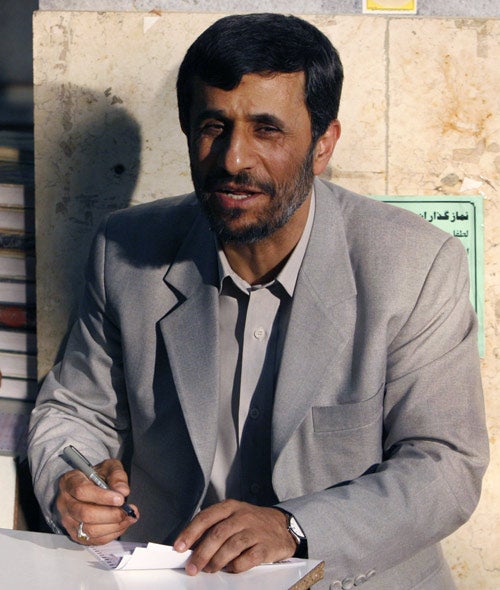Iranian elections: 'We have no hopes for the future'
Anne Penketh in Tehran meets students who have no faith in democracy

Your support helps us to tell the story
From reproductive rights to climate change to Big Tech, The Independent is on the ground when the story is developing. Whether it's investigating the financials of Elon Musk's pro-Trump PAC or producing our latest documentary, 'The A Word', which shines a light on the American women fighting for reproductive rights, we know how important it is to parse out the facts from the messaging.
At such a critical moment in US history, we need reporters on the ground. Your donation allows us to keep sending journalists to speak to both sides of the story.
The Independent is trusted by Americans across the entire political spectrum. And unlike many other quality news outlets, we choose not to lock Americans out of our reporting and analysis with paywalls. We believe quality journalism should be available to everyone, paid for by those who can afford it.
Your support makes all the difference.Erfand caught sight of me, notebook in hand, talking to Iranian voters outside the polling station on Tehran's Vanak square on Friday. "Hey, why don't you talk to somebody who didn't vote?" he called out in impeccable English. "We hate this regime and our crazy president," he went on as he offered me a share of his cake.
Erfand is a student at Tehran's Shahid Beheshti university. If the Islamic police had heard him, he would have been hauled off to jail before he had finished his snack. And to challenge the Islamic system means possible execution. For Erfand and his middle-class friends, their future in the Islamic republic promises only disillusion and despair. He plans to emigrate.
"We don't vote because it won't make any difference," he said. "It's like this: if you don't vote, [President Mahmoud] Ahmadinejad's friends will come to power. But if we vote, other countries will look at the turnout and think that we support the government."
Mohamed, a 22-year-old student, said: "The situation is difficult, but you can't do anything about it. It's not just me, but any young person. You can't do anything, you can't demonstrate, there are no rallies, they would arrest you. I voted in the last election, but not again. When the people I wanted didn't get in, I thought: what's the point? I was 100 per cent disappointed."
His girlfriend, Sepideh, an accountancy student, joined in. "We have no hopes for the future," she said. "Our parents can't afford a house – so how can we?" For Sepideh, the fear of the Morality Police is real. Over 2 million people, both men and women, have been detained in the last two years of the government's fashion crackdown against youths with "inappropriate" hairstyles and women whose headscarves reveal too much hair.
One confrontation ended up on YouTube. A girl was arrested for "bad hijab" and some boys stepped in to support her against the police. Then a lot of people gathered and started to chant anti-Islamic slogans."We have no security," said Sepideh. "We are afraid of being arrested by the police. What can we do? Nothing. They say we have to obey."
Negar, a sociology student, said: "A friend of mine was arrested because her trousers were too short, and she wasn't wearing socks. They treated her like a prisoner. They put a number on her. Last summer it got much worse.
"The basic problem for young Iranians is that they don't get enough sex. Where can they go? It's illegal to hold hands with a man who is not in your family, and you can't kiss. Parents disapprove if you go home, so some people make out in cars. If the police see them, they are flogged. In some cafés, they pay the police to turn a blind eye to boys putting their arms round girls, or to girls who take off their headscarves.
"What about Ahmadinejad? He's terrible, but don't tell him. He doesn't pay attention to the people in Tehran, just those who live in small towns."
Join our commenting forum
Join thought-provoking conversations, follow other Independent readers and see their replies
Comments